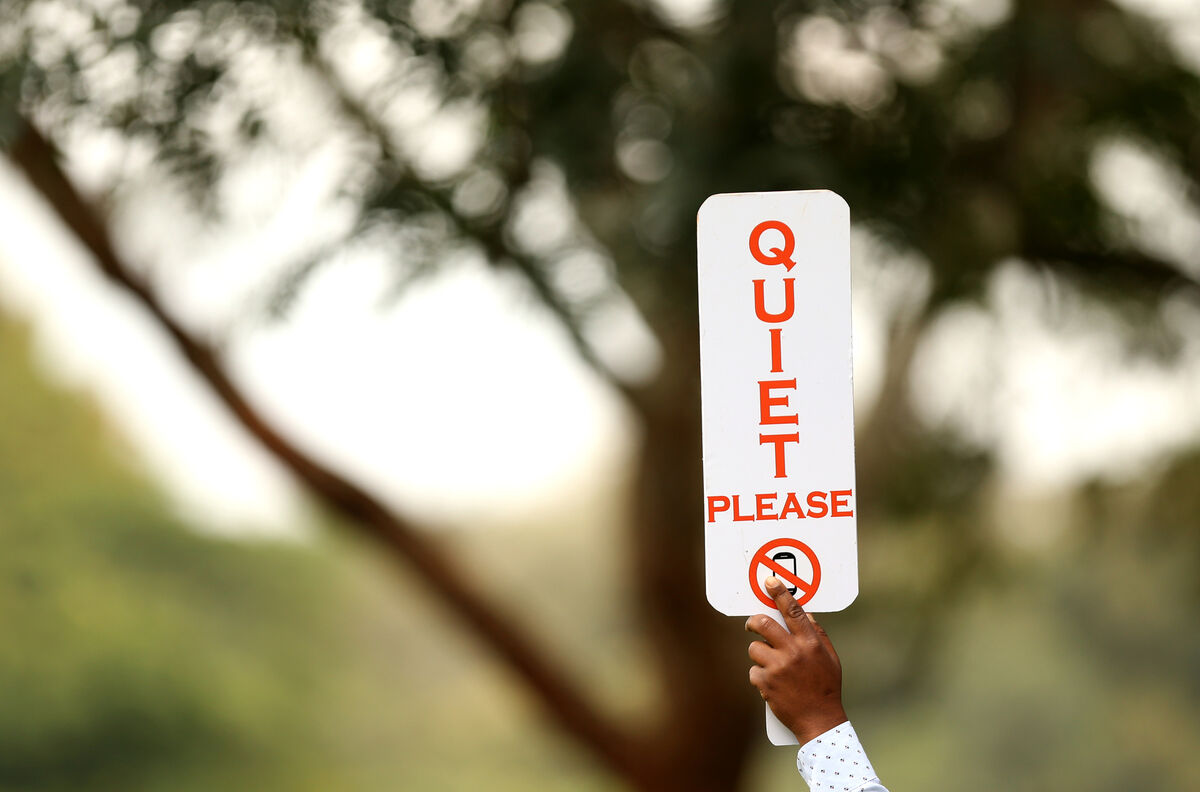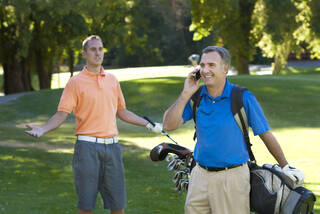Speak Up or Shut Up? The Etiquette of Unsolicited Golf Advice

If there’s one thing planet Earth has enough of, it’s golf advice. For the most part, that’s okay. For starters, most golf advice is tucked away, waiting to be found by somebody in need of specific information at a specific time. We’ve all come home from a rough day on the golf course and asked Google how to fix a slice.
The sheer volume of information about the golf swing that’s just a search away guarantees that no matter how you learn best – whether it be reading, photos, video, drills, or props – you can find something that will help you.
Having all of that golf advice and the tips, tricks, drills, feels and gizmos we could ever imagine at our fingertips, means there’s one source we don’t need to work for our personal game improvement: You.
While it may be tempting, here’s why it’s not okay to offer up your personal wealth of knowledge to your playing partners, unsolicited. Don’t worry, as with any golf rule, there are exceptions.
Etiquette of Giving Golf Advice
There are so many reasons why you should not give your playing partners unsolicited golf advice, even if they are struggling mightily.
You’re Not Qualified
Let’s start with the most obvious. You’re (most likely) not a trained golf professional. If you were, you’d be charging for your advice, never giving it away for free. That means that the chances of you properly diagnosing your buddy’s blunder is minuscule. And the chances of providing the proper prescription are even smaller.
The Mental Game
You’ve heard of flow state, or being in the zone. You become much more effective when you use the right brain to execute a task, including hitting golf shots. Replacing technical thoughts with athletic reactions is a huge part of a successful round of golf.
By giving a playing partner new advice, you’re activating the left brain, which leads to poor golf shots. If that happens, your playing partner will quickly go from being mad at the game, to being mad at you.
We’re Talking About Practice
Let’s pretend you successfully diagnose the issues your playing partner faces, and you know just the solution to their problem. It can be really hard, all but impossible, to keep this information to yourself.
Still, you should.
If the advice you’re so tempted to give truly is new information to your friend, how can you expect them to implement it correctly, and immediately?
“Hey, you’re not shifting your weight in your backswing. Try feeling like you’re loaded up on your back foot.”
That sounds innocent, but even if you’re right, you’re suggesting a completely different-feeling golf swing, which will cause a domino effect of changes to the rest of the swing. The chances of that leading to improved golf mid-round are laughable.
This advice is best saved for between rounds, when your student can practice, experiment, hit shots without consequence, monitor ball flight, flaws, and tendencies, then hone in the improved swing.
Exceptions
We don’t condone giving unsolicited advice on the golf course, but there are some situations when it’s better to speak up than bite your tongue.
Danger is Lurking
Safety first, right?
If you notice somebody is in harm's way, always say something. For example, if an errant ball is heading towards your group but your friend is too in the zone standing over their shot to notice. Feel free to call them off.
Etiquette-Related Advice
Giving advice to improve somebody’s golf swing during a round is frowned upon, but giving them advice that will improve their etiquette is more than appropriate.
If you’re playing with somebody who doesn’t quite adhere to proper golf etiquette, don’t hesitate to get them up to speed.
Newer golfers may not know not to walk through somebody’s putting line, to replace their divots in the fairway or fix their ball marks on the green. They might not even know to be quiet while someone else is hitting, or to be aware of where they cast a shadow.
It’s not only okay for you to help your playing partners learn proper etiquette, it’s your responsibility as their more-experienced playing partner.

22 Golf Etiquette Rules You Need to Know
Course Knowledge

Sharing course knowledge is one exception to the rule
While you should avoid giving swing advice to your fellow playing partners, it’s encouraged to share your local knowledge of the golf course.
Do you notice your partner is aimed down the wrong fairway off the tee, or getting a yardage to the wrong green? Let them know.
Did they pull driver, unaware of a forced carry or trouble lurking right at their typical carry distance? This is a great opportunity to show off just how much you know.
This type of advice will help their score without interfering with their swing or swing thoughts, and your entire group will enjoy the added bonus of an improved pace of play.
First-Time Golfer
If you’re playing with a first-time golfer who truly needs some pointers on swinging a golf club and the basic concepts of golf swing fundamentals, this is your rare opportunity to give unsolicited swing advice during the round.
This is a big responsibility, do not use it recklessly. Only give advice that is easy to understand and follow for a new golfer. Focus on bigger concepts rather than implanting small technical thoughts, and remember, less is more.
Rules on Giving Golf Advice
Giving advice on the golf course is not only ill-advised, it’s usually downright illegal.
That’s right, you can be penalized for asking for or giving advice to other golfers.
According to USGA Rule 10.2, the Rules of Golf prohibit advice-giving, stating that you must not “give advice to anyone in the competition who is playing on the course, ask anyone for advice, other than the player’s caddie, or touch another players equipment to learn information that would be advice if given by or asked of the other player.”
A Word of Advice
There’s a simple reason unsolicited golf advice is unsolicited: the recipient does not want it. The next time you have the urge to fix your friend’s swing mid-round, remind yourself that you’re more likely to cause harm than you are to help, and everyone will enjoy the day on the course more if you save it for the 19th hole.